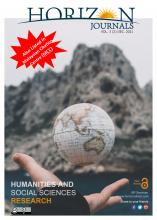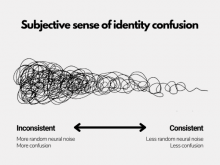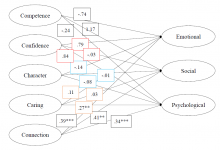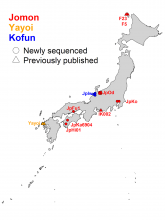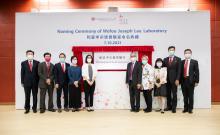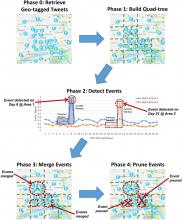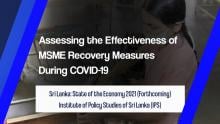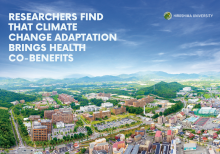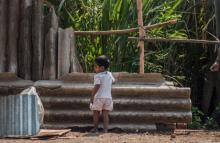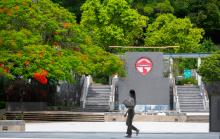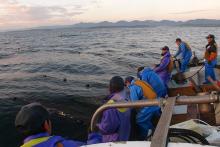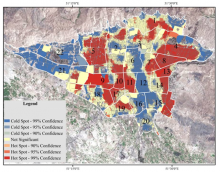Social sciences
News
20 Dec 2021
We are pleased to announce that the DEC 2021 issue of the Journal of Humanities & Social Sciences Research (JHSSR), Vol. 3 (2) Dec. 2021 has been published ahead of time on 30 Nov 2021 and is now live at the Journal’s web page. We invite you to explore the seventh issue of our Journal of Humanities & Social Sciences Research with excellent essays.
13 Dec 2021
The lockdowns introduced in 2020 to curb the spread of COVID-19 saw the narrative “nature is healing” gain prominence. However, the notion that nature, in the absence of people, was healing fizzled out fairly quickly with the emergence of fresh environmental challenges, most notably, the resurgence of single-use plastics. This blog examines the ecological fallout of the pandemic and suggests policy options for Sri Lanka to avert the looming environmental disaster.
09 Dec 2021
Micro-plastics cross blood brain barrier, Stomach cancer atlas, Omicron variant isolated, 120-year-old reaction turned on its head and Reporting through the coup, all in the December Editor's Choice. Plus our latest podcast: Decentralization and Democracy in Myanmar.
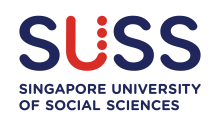
07 Dec 2021
The University launches Node for Inclusive Fintech (NiFT) as thought leader in fintech sector that champions inclusivity issues to meet the United Nation’s 2030 Sustainable Development Goals.

19 Nov 2021
A joint research team with members from Ehime University and the Ehime University Senior High School developed an e-learning program to provide university-level information education to high school students, improving their information skills to the level of second-year university students or higher.
19 Nov 2021
Feeling unsure of yourself? Your brain’s background noise may be interfering with the long memory signals communicated by your neurons’ electrical chatter.
10 Nov 2021
Japanese customers have higher expectations of restaurants selling traditional foods more when they display an older year of establishment.
02 Nov 2021
Ghana’s high youth population suggests that evidence-based programs specifically targeting young people’s development and mental health are key to the country’s socio-economic growth. As a result, social scientists are focusing on rigorous testing of the links between these two sides of personal thriving.

15 Oct 2021
Dozens of researchers tell Nature they have received death threats, or threats of physical or sexual violence.
11 Oct 2021
A long-standing hypothesis, the dual-structure model, posits that Japanese populations derive dual ancestry from indigenous Jomon hunter-gatherer-fishers and succeeding Yayoi farmers. We conduct paleogenomic analyses of people of the Jomon, Yayoi, and Kofun periods from Japanese archaeological sites. We identify a later influx of East Asian ancestry in the Kofun period and clarify that the genome of the modern Japanese population is composed of three ancestral components, proposing a tripartite model of Japanese origins.
08 Oct 2021
With a generous donation from respected social entrepreneur Dr Joseph Lee Chung-tak, Chairman of Wofoo Foundation, the Wofoo Joseph Lee Laboratory has been established to facilitate pioneering research in Lingnan University (LU)’s Department of Applied Psychology.
24 Sep 2021
An algorithm that detects events occurring across different time and geographical scales on social media could enable a more timely response to emerging events.
16 Sep 2021
Accommodation for young people in Hong Kong has long been at the top of the policy agenda. Recent research conducted by Lingnan University in Hong Kong (LU) and the City University of Hong Kong on the younger generation’s housing opportunities finds that 26 per cent of parents who responded expect to subsidise their adult children when they buy a property. Findings also suggest reliance on the family is now increasingly frequent, and important to young adults who wish to live independently and have a choice.
15 Sep 2021
Lockdowns and restricted mobility have devastated labour markets across the world. According to the International Labour Organization (ILO), the equivalent of 225 million jobs was wiped out globally due to employment and working hour losses in 2020 compared to 2019 (Q4). These working hour losses are four times higher than those experienced during the global financial crisis in 2009. The COVID-19-instigated recession has affected the quantity and the quality of jobs, with increasing levels of informal types of work with lower remuneration. Restoration of labour markets is important to minimise damage to human development and increase aggregate demand, thereby boosting economic recovery. This blog looks at why it is important to have targetted policy interventions to revive the labour market by illustrating that the impact of COVID-19 is different across occupations and industries.
14 Sep 2021
Social media makes it easy for us to know how friends are doing recently, and even give us clues about our friends’ social networks. But in order to know the social networks of people of the past, you may have to bury yourself in countless ancient books and put in a lot of effort to figure out their actual relationships. A historian from City University of Hong Kong (CityU) who actively promotes digital humanities research uses digital tools to study the history of the Song dynasty. For example, he is drawn to the “circles of friends” from the letters written by historical figures from the Song dynasty in China. He has been sharing his experience in applying computer and information technology to the humanities in recent years. In addition to revolutionalising the humanities research model, he hopes to gather scholars from different fields to conduct joint research initiatives.
13 Sep 2021
The MSME sector in Sri Lanka amounts to 1.017 million establishments, employing approximately 2.25 million persons. This approximates to more than 90% of total establishments in the country and 45% of total employment.
08 Sep 2021
Unprecedented declines in merchandise trade, foreign direct investment (FDI) flows, tourism and cross-border migration have all been hallmarks of the economic fallout of COVID-19. As a result, growth expectations for countries worldwide dimmed. Nonetheless, thanks in part to substantial expansionary monetary and fiscal policies being rolled out to achieve pre-COVID economic recovery levels and the development of vaccines, the contraction in global trade and economic output are less than what was anticipated. The Sri Lankan economy too has been impacted by these external developments, witnessing fluctuating fortunes in its external sector performance. This blog discusses the impacts of global economic developments on Sri Lanka’s external sector and suggests ways to cushion them.
03 Sep 2021
The COVID-19 pandemic has increased attention on links between public health and the planet’s health — areas traditionally addressed in separate science and policy circles. Now, an international research collaboration conducted the first comprehensive review of urban climate change responses and potential human health improvements.
30 Aug 2021
On 20 May 2021, Sri Lanka’s worst-ever marine disaster occurred when a fire erupted on the Singapore-registered MV X-Press Pearl container ship just 18 km Northwest of Colombo. While the long-term cost is yet to be determined, the negative impact on industries such as fisheries and tourism, and people who rely on the coastal resources of Sri Lanka is already apparent.
12 Aug 2021
The nutritional status of children under five in Sri Lanka has not shown a significant improvement for the last 20 years. It has also been lagging behind most of the other health and social indicators on children. IPS research shows that household income, inadequate nutrient intake, breastfeeding practices, mothers’ education, etc., play a major role in child undernutrition in Sri Lanka. Moreover, given significant losses in household income experienced at the hands of the COVID-19 pandemic, nutrient intake may have declined further over the past year. As such, it would be a challenging task for health planners to develop effective strategies to minimise undernutrition among children under five years. This article highlights some of the facts contributing to child undernutrition in Sri Lanka and suggests ways to address this critical issue.
02 Aug 2021
A recent study conducted by Lingnan University (LU) in Hong Kong confirms a positive association between educational attainment and life satisfaction at the individual level. However, once labour market outcomes and especially income levels are accounted for, this positive relationship disappears.
22 Jul 2021
The Covid-19 pandemic has improved perceptions of facial attractiveness and healthiness of people wearing face masks in Japan.
07 Jul 2021
Lonely older adults live at least three fewer years, in poorer health, and are less active than non-lonely peers, say ageing research experts.
30 Jun 2021
Assistant Professor Mai Ishihara is the first female full-time researcher at Hokkaido University’s Center for Ainu and Indigenous Studies (CAIS) and is the first female faculty member who openly reveals her Ainu ancestry. As a quarter-Ainu, Ishihara talked about how she had been subdued by her own ignorance, and later by silence, of her Ainu ancestry. She transformed her struggle and her views on the pain faced by her Ainu (indigenous people of Hokkaido) ancestors into a book based on her long-term research.
15 Jun 2021
Paris, June 11 – Spending on science worldwide increased (+19%) between 2014 and 2018, as did the number of scientists (+13.7%). This trend has been further boosted by the COVID crisis, according to UNESCO’s new Science Report, The Race against Time for Smarter Development.
29 May 2021
A look at Japan’s mimamoru approach suggests that adults’ non-intervention in kids’ fights allows children to nurture social and interpersonal skills on their own. Is it worth a try in other countries?
27 May 2021
The 2011 Great East Japan Earthquake and Tsunami devastated fishing communities along the Miyagi coast. A Tohoku University anthropologist carried field research in the small fishing community in Isohama. Here he found elements of competitive and collective behavior ensuing following the earthquake.
25 May 2021
A recent survey conducted by Lingnan University (LU) and the Education University of Hong Kong (EdUHK) finds that 11 to 14 per cent of older adults eligible for the current three cash welfare subsidies do not claim them, mainly because of the complexity of application procedures, high transaction costs and perceived stigma. The research team suggests the Government should reduce administrative burdens, and re-brand welfare subsidies for older adults.
14 May 2021
Many hurdles remain to achieve gender equality in Myanmar politics and society at large. Research supported by Canada’s Knowledge for Democracy Myanmar Initiative is identifying opportunities to close the gap.
16 Apr 2021
A person who owns a car or who has a college education may be less vulnerable to COVID-19, according to an analysis of cases in Tehran, Iran, one of the early epicenters of the pandemic. While such variables do not inherently lower a person’s risk, they do indicate an infrastructure of protection that persists despite how densely populated a person’s district might be.
Events
Sorry, nothing coming up for this discipline
Researchers
Sorry, nothing coming up for this discipline
- « first
- ‹ previous
- 1
- 2
- 3
- 4
Giants in history
Sorry, nothing coming up for this discipline


